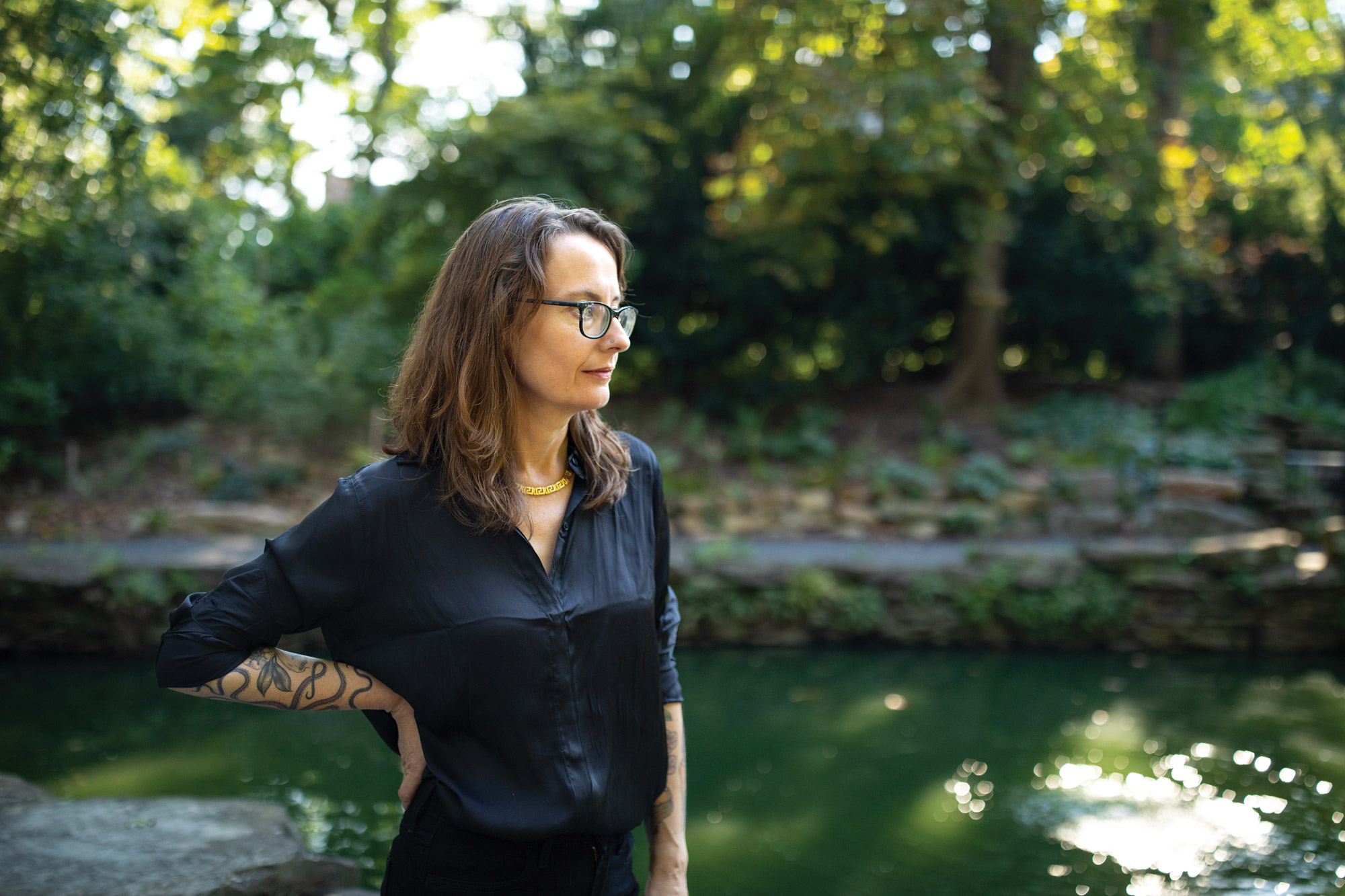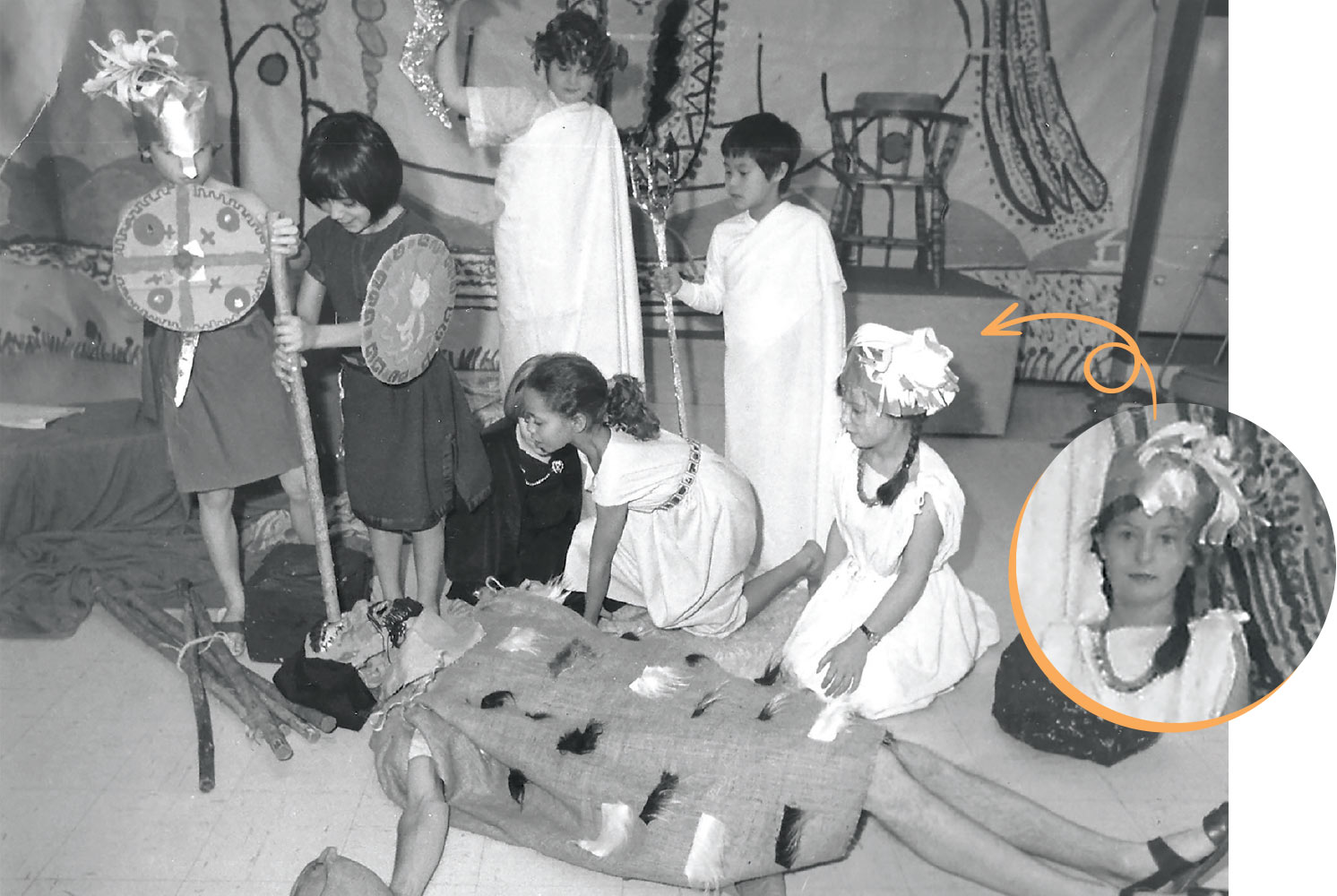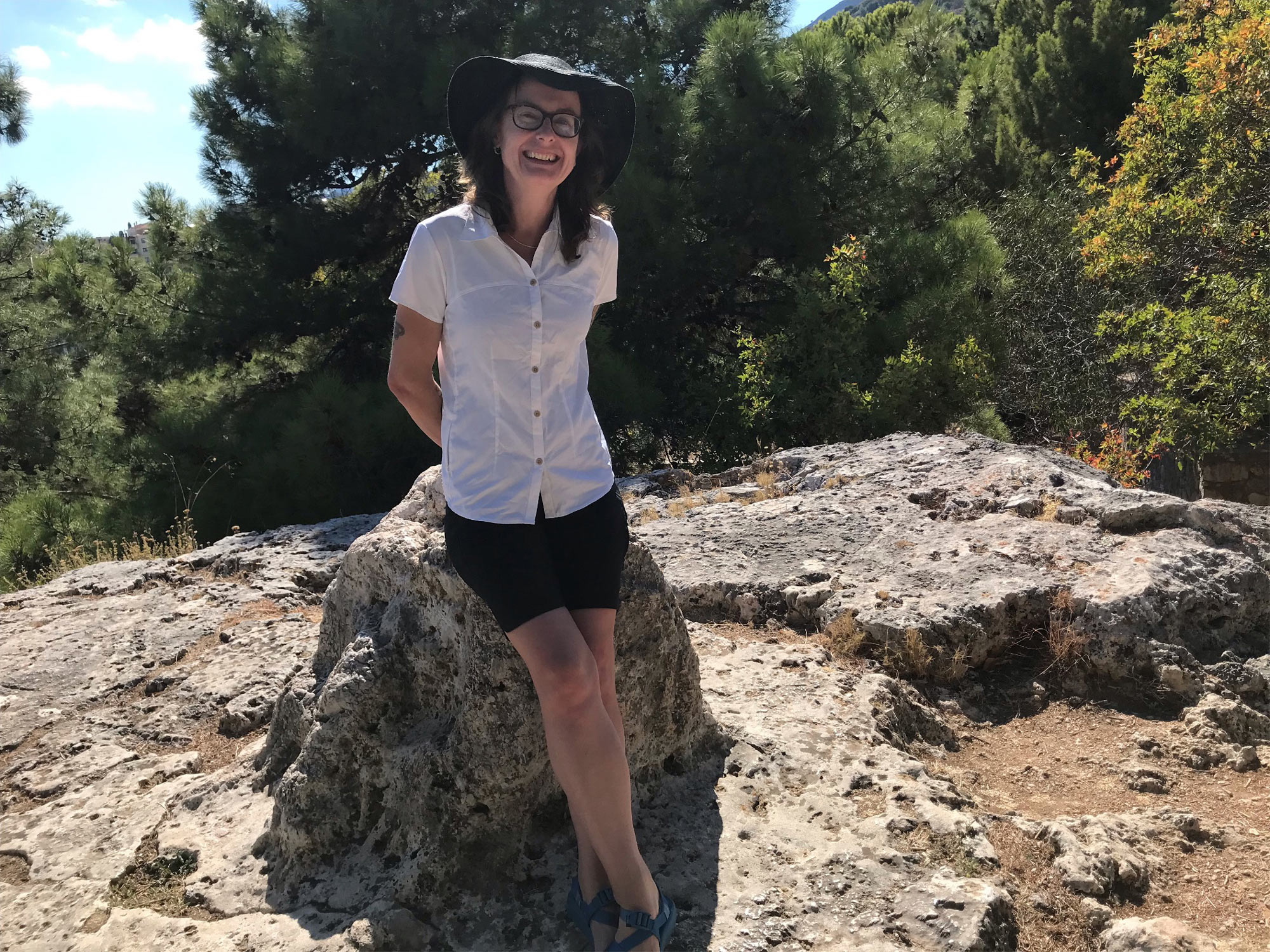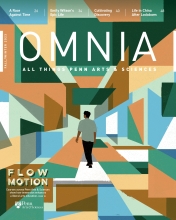Emily Wilson’s Epic Life
The Classical Studies professor on the power and responsibility of translation, the allure of ancient worlds, and the value of the strange.
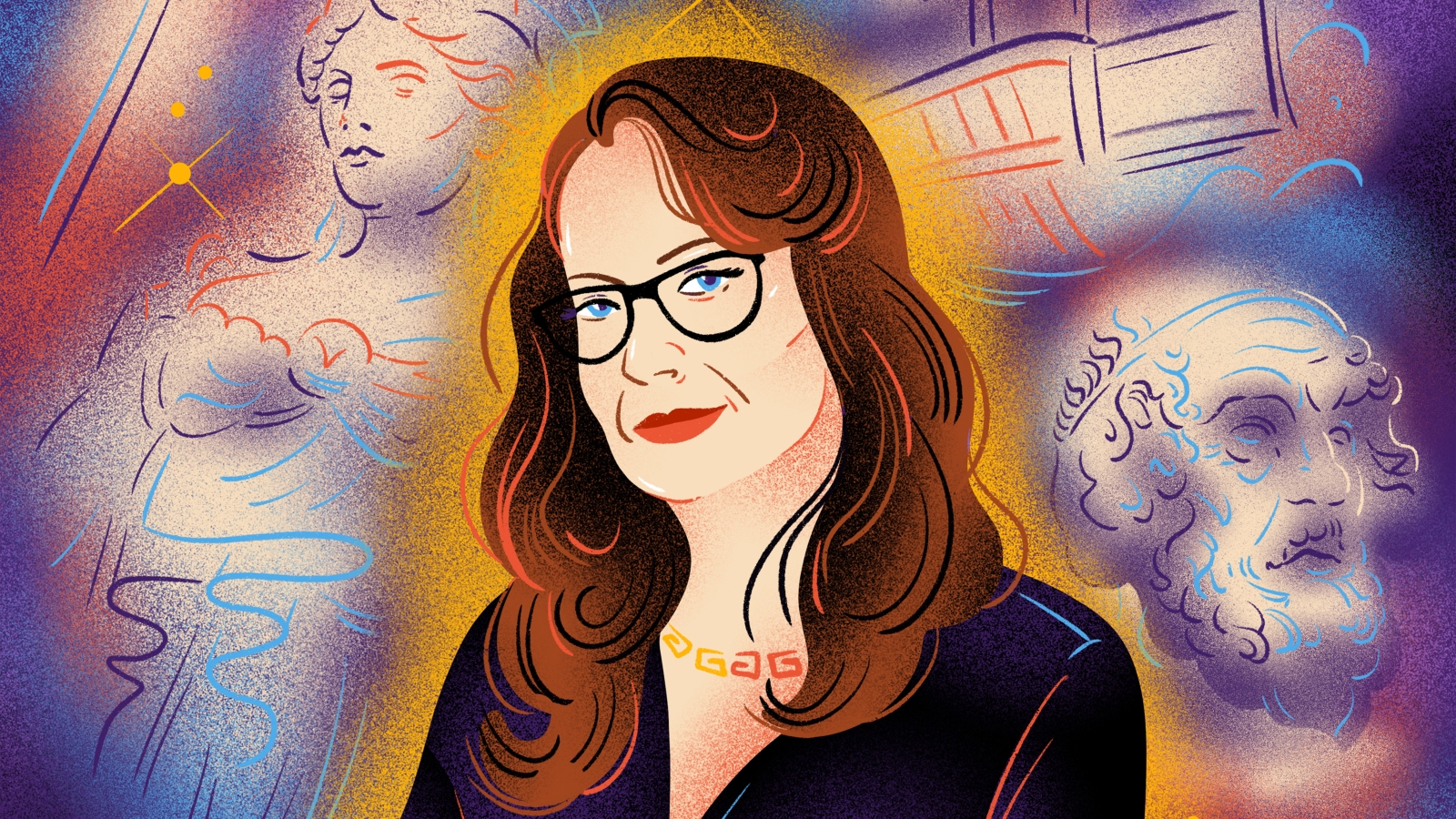
Six years ago, Emily Wilson became somewhat famous. Not Kardashian famous, but famous for a classical scholar, following the publication of her translation of Homer’s The Odyssey. Wilson was the first woman to translate the ancient epic into English, and she made the unusual and challenging choice to use a poetic meter, combining that with straightforward English and her distinctive point of view.
The result was lauded from the Bryn Mawr Classical Review to The New York Times Book Review, and even The Financial Times, which wrote, “She scrapes away at old, encrusted layers, until she exposes what lies beneath.” The translation sold thousands of copies and was added to college and high school syllabi.
Wilson, College for Women Class of 1963 Term Professor in the Humanities and Professor of Classical Studies, was profiled in The Times, The New Yorker, and elsewhere. She’s been invited to speak across the United States and Europe. She was awarded two prestigious fellowships, the MacArthur “Genius Grant” and the Guggenheim, and was chosen to judge the Booker Prize competition. She has 44,800 followers on the social media site formerly known as Twitter.
“I was astonished,” she says about the book’s reception. “Nobody had ever heard of me before that book came out. My editor had warned me that most re-translations of ancient texts sell a thousand copies. So, I felt extremely lucky that it seemed to hit with a lot of readers, and then took on a life of more and more people responding in different ways.”
This fall Wilson published her translation of Homer’s other epic, The Iliad—now with her name above the title. While the circumstances and expectations were wildly different, her goals remained the same: to illuminate the text in a new way, make it metrical, not render it boring, and share both the strangeness and familiarity of an ancient world that fascinates her.
Getting From There to Here
It’s easy to assume that translation “is just a transparent window,” Wilson says, a literal adjustment of words from one language to another. Some works are even published without the translator’s name on the cover.
But translations are so much more than that, she says. “I don’t want to go into any project thinking, ‘My job is to look up all the words in the dictionary and plunk them down.’ My goal is to think through the effect of the original, including the sonic, musical effects and the emotional effects. It’s a very complicated act of interpretation, which involves all this interplay between the interpretive, scholarly, creative, and so on.”
One challenge is the gulf between languages. When one Greek word can have three different meanings in English, students pass exams by putting them all down. A translator must decide on just one in the same way she must also think through each character thoroughly. (Homer has multitudes and gives each a distinctive voice.)
My goal is to think through the effect of the original, including the sonic, musical effects and the emotional effects. It’s a very complicated act of interpretation.
All that work is in service of outreach on behalf of an ancient world, Wilson believes, and it’s a mission to which she is fully committed. During the pandemic lockdown, she created an Odyssey-a-Day video series in which she dramatically read a condensed version of each book of her translation. She put on a gold laurel wreath to become the goddess Athena, a backward baseball cap for Odysseus’ son Telemachus, a vivid red wig as Calypso, and then posted the videos online.
On Twitter, now X, Wilson shares the pain and exhilaration of her process. In an 18-tweet thread on translating one line of The Iliad—a scene where the Trojans analyze the omen of an eagle dropping a snake—she concludes, “I will noodle with this and a few thousand similar lines and phrases for as long as they let me. It is a privilege to spend so much time confronting this kind of insoluble problem, exploring the crannies between two languages, fighting to save a beautifully elusive bird.”
But Wilson also believes that mission of bridging two worlds may be part of the reason translation has been undervalued in academia. “There’s a confusion about whether it can be both truthful and responsible, and also that the translator’s own work and identities and opinions might be relevant.”
Some of the prejudice goes even further, she says. “There’s been this idea that translation doesn’t involve independent or original thinking or research, or that it might be of interest to the general public but of no interest to a serious scholar.” But it requires a serious scholar to fully understand the text of the original—and all the possibilities available in the translation language. “There can be a tendency to underestimate the need to think about the language you’re translating into and to have a really clear and deep knowledge of what’s possible.”
Wilson does say this mentality is changing, and she feels fortunate to be at Penn. “My colleagues, my department have been extremely supportive about my work as a translator.”
Strange New Worlds
That work inherently involves something alien: a different language. It also can take us to another time and place and to new ways of thinking about life.
“You get a different vision of the world if you can think in a different language” or comprehend aspects of an ancient culture so different from our own, Wilson says. “It’s always this delicate balancing act: How do I present this poem so that it feels alive to you and you can understand it and understand the themes, characters, feelings, sounds, narrative arc? It shouldn’t be more difficult than the original, but you should see clearly what is alien.”
It’s easy to recognize strangeness in animal sacrifice or slavery, but what about how we conceive of our bodies? There is a trope for heroes in The Iliad, Wilson explains: “It’s a set of limbs tied together when you’re alive, and then it falls apart,” she says. “Death is an untying. I shouldn’t put in a different metaphor. I should make that metaphor clear to you so you can get into that alien mindset. That’s at the center of the poem, both the emotional and physical unraveling of the human.”
That introduction to a different way of seeing makes Wilson believe every child should have access to learning a foreign language from a good teacher. “I don’t want the study of ancient languages to die. I want there to be some people—and not just people who are privileged—to have the ability to learn those languages. But ancient [language] or not, all kids should have an opportunity to engage” in this way.
From The Odyssey to The Iliad
Wilson spent five years in the world of The Odyssey as she translated it. Shortly after she finished, she agreed to translate The Iliad, thinking perhaps she was on a roll. “Once I started, I thought, ‘Actually, no, I’m not on a roll. This is completely different, and I need to stop and rethink everything.’”
Though both works are composed in the same archaic Greek language and emerge from the same poetic world, Wilson had to adjust to the different atmosphere of this poem. “The Iliad is such a deeply painful and tragic poem,” she says. “You constantly have to think about the style and specificity of this text and how it is different from another, even by the same author.”
There were new technical challenges as well. Homer’s originals are in a poetic meter, where the syllables are arranged to create repeating units of sound. One of Wilson’s primary goals with both translations was to do the same, though because of the language change, she used a different meter. To feel the rhythm, she read the originals out loud multiple times and did the same with her drafts. “Meter does something for the ear and for the body,” she says.
With The Odyssey, she even kept the same number of lines as the original by choosing English words with the number of syllables she needed. But The Iliad is full of names. “It’s about powerful men who form networks with each other,” says Wilson. “And their power is contingent on, ‘I’m the son of so-and-so, I’m the companion of so-and-so.’ Their patronymics [father’s names] and comrades need to be named at every turn, as well as their epithets—the things they’re associated with. That seems to me so essential to the poem’s meaning, that names are what live on after they’re all dead.”
She spent months working on pacing and line length. The result “felt so stodgy in a way that the original wasn’t, so then I went back to pentameter, and I threw out my first two books and started again,” she says. “After many, many drafts, I felt I was starting to get it.”
A Classic Path
It takes stamina and love for the classics to put that much heart and soul into translating Homer. Wilson’s passion likely got its start with an early chance to inhabit Athena (whom she’s called “the most kick-ass goddess of them all”) during a dramatic production of The Odyssey in grade school.
“There are ways that I’ve been very, very lucky,” says Wilson. The daughter of an Oxford English professor and a writer, she says, “I grew up in a very bookish household where there was an assumption that everyone was going to be reading all the time.”
In high school she was able to take both Latin and Greek. “I was very interested in literature and languages, but I was also shy about talking,” Wilson says. “And there was something great to me that you can get access to these very, very exciting stories which are so full of violent and emotional things happening, but you also don’t have to open your mouth in class.”
That’s not the right path for everyone, and Wilson is glad for the current discussion about pedagogy in ancient languages and for some pushback against the old ways, including movement toward teaching them more like living, spoken languages. “Different people have different learning styles. But for me as a teenager, it was exciting to have that old-school model. It opened up an awareness of the structure of language.”
Wilson went on to read classics at Oxford, studying ancient Greek and Roman literature, philosophy, and history. Because of her interest in how antiquity can be reinterpreted in later periods, she earned a master’s degree in English literature before traveling to Yale for her doctorate in classics. “Getting to be a translator of these texts has been a way of actively participating in that tradition,” she says.
She has written six other books, including translations of tragic plays by Euripides and Seneca and a verse translation of Oedipus Tyrannos that she managed to produce between The Odyssey and The Iliad. Her other work includes The Greatest Empire: A Life of Seneca; The Death of Socrates: Hero, Villain, Chatterbox, Saint; and her first book, Mocked with Death: Tragic Overliving from Sophocles to Milton. She’s also been the classics editor of two Norton Anthologies since 2012 and edited Bloomsbury’s A Cultural History of Tragedy in Antiquity. At Penn, she chairs the Program in Comparative Literature and Literary Theory.
“A thread running through it all is an interest in the complexity of ancient texts and ancient concepts,” she says, “the history of philosophy as well as of literature, the diversity of these texts. Even if you look at just one, there are so many different ways to interpret, so many different voices within this text, so many different possible responses.”
The Classical Future
Wilson is taking full advantage of the opportunities for engagement brought by her success and by talking to people beyond her students and colleagues about the Homer poems. “It’s exciting just seeing the cultural engagement,” she says. “That’s really invigorating.”
For generations, children have been introduced to the ancient myths through kid-sized versions, like Wilson’s grade school play or now, Rick Riordan’s Percy Jackson books. There’s clearly an enduring interest, judging by the success of Wilson’s books and reimaginings like Madeline Miller’s Circe. Yet the number of classics majors and departments have both been declining, and the field of classical studies itself has been experiencing upheaval and self-examination.
Translation and engagement with language, engagement with big difficult books and thinking through questions about form and poetry and sound—those shouldn’t just belong to me, they should belong to everyone. Homer should belong to everyone.
“There’s so much more recognition now than even five or 10 years ago about everything that’s wrong with the history and the existing structures of the field in terms of access and privilege and the weird way ancient learning is set up,” Wilson says. “Why do we put Latin and Greek together rather than Greek and Hebrew or Latin and Sanskrit? I don’t think you can defend it, but that history has happened. What do we do with that?”
Wilson’s answer: be honest about it, keep grappling with it, and get creative about how to study the ancient world. She’s excited for the challenge. “There’s been an enormous enrichment of classical studies over the last century,” she says. But “there needs to be more change, largely in terms of who gets to be in the room.”
Wilson put some of her MacArthur grant toward creating the Elsie Phare Fellowship—named for her grandmother, who would not have been able to attend college without a scholarship—to support post-baccalaureate students in classical studies. The fellowship committee is particularly interested in funding students from groups underrepresented in the classical studies community.
“I want to be thinking about my work beyond me,” she says. “I’d like to see the sort of name recognition I have be a gateway to younger scholars, more diverse demographics of people realizing that classics is for everyone. Translation and engagement with language, engagement with big difficult books and thinking through questions about form and poetry and sound—those shouldn’t just belong to me, they should belong to everyone. Homer should belong to everyone.”



